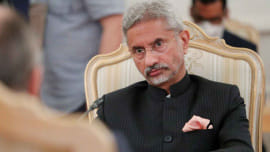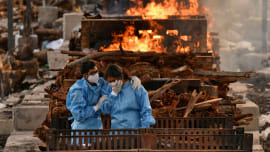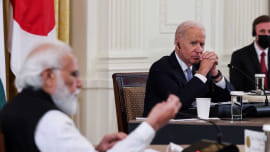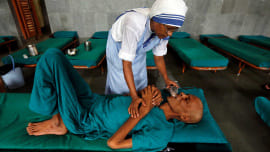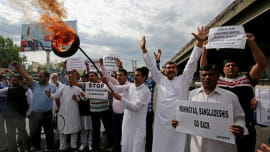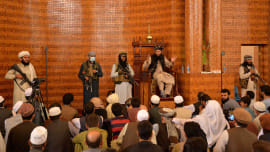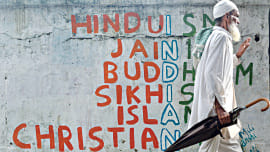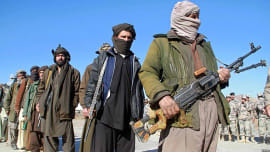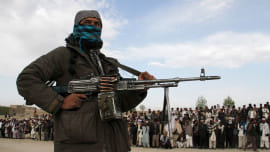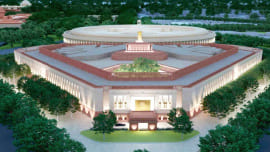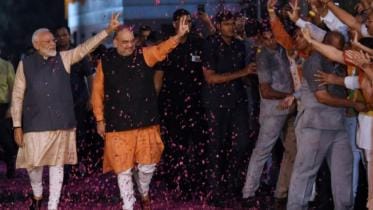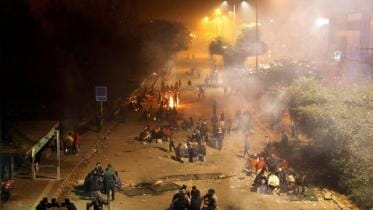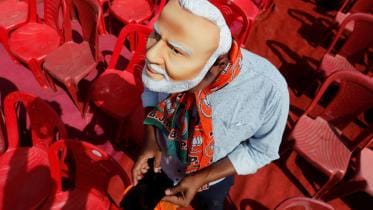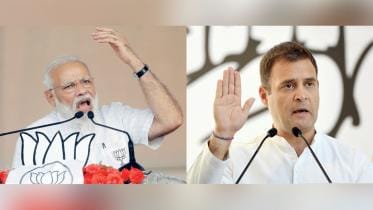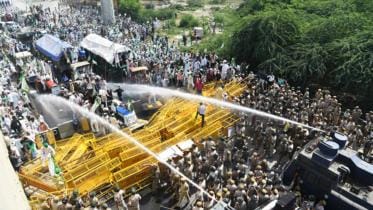The promise and pitfalls of Indian foreign policy
9 June 2022, 18:00 PM
AWAKENING INDIA
India’s Covid Con
17 May 2022, 18:00 PM
AWAKENING INDIA
What is India doing in Ukraine?
8 April 2022, 18:00 PM
AWAKENING INDIA
India’s Chauvinist Crusade
6 January 2022, 18:00 PM
AWAKENING INDIA
Column by Shashi Tharoor: Modi’s Anti-Muslim Jihad
22 November 2021, 18:00 PM
AWAKENING INDIA
India’s Taliban Problem
7 October 2021, 18:00 PM
AWAKENING INDIA
Among India’s Believers
6 August 2021, 18:00 PM
AWAKENING INDIA
India’s Taliban Dilemma
22 July 2021, 08:42 AM
AWAKENING INDIA
Pakistan’s Taliban Monster
9 June 2021, 18:00 PM
AWAKENING INDIA
Narendra Modi’s Potemkin Democracy
15 January 2021, 18:00 PM
AWAKENING INDIA
The promise and pitfalls of Indian foreign policy
Two episodes in the first week of June starkly illustrate both the promise of Indian foreign policy and the pitfalls it faces as a result of the country’s increasingly toxic domestic political culture.
9 June 2022, 18:00 PM
India’s Covid Con
India is no stranger to political controversies. At least half a dozen rage in its fractious public life at any time. But perhaps the most unseemly dispute recently has been the one over the country’s Covid-19 mortality figures.
17 May 2022, 18:00 PM
What is India doing in Ukraine?
The Ukraine war has exposed India’s strategic vulnerabilities in a tough neighbourhood as arguably nothing else could, raising fundamental questions about the country’s global position and regional security.
8 April 2022, 18:00 PM
India’s Chauvinist Crusade
The restrictive, illiberal trend that has come to characterise India over the last five years has a new data point.
6 January 2022, 18:00 PM
Column by Shashi Tharoor: Modi’s Anti-Muslim Jihad
After India’s recent defeat by Pakistan at the T20 Cricket World Cup tournament, Indian bowler Mohammed Shami faced vicious trolling on social media.
22 November 2021, 18:00 PM
India’s Taliban Problem
In the weeks since the Taliban’s theocratic terrorists returned to power in Kabul, the people of Afghanistan, particularly its women and girls, have been subjected to unimaginable suffering as the world’s attention turns to other issues. But many other countries, and especially India, have reason to worry.
7 October 2021, 18:00 PM
Among India’s Believers
It is rare for a public-opinion survey to shake established perceptions of a country in the way a recent Pew Research Center study of religion in India has done. The revelations in Pew’s comprehensive survey, based on interviews with 30,000 adults in 17 languages between late 2019 and early 2020, have astonished many.
6 August 2021, 18:00 PM
India’s Taliban Dilemma
“The future of Afghanistan cannot be its past,” India’s External Affairs Minister S Jaishankar had told a meeting in Dushanbe, Tajikistan, on July 14. It is precisely the spectre of a rerun of the Taliban rule in Afghanistan from 1996 to 2001 that has been firmly raised with its swift military surge across much of that country in the last few months.
22 July 2021, 08:42 AM
Pakistan’s Taliban Monster
The late head of Pakistan’s powerful Inter-Services Intelligence (ISI) agency, Lieutenant General Hamid Gul, was fond of boasting that when Afghanistan’s history came to be written,
9 June 2021, 18:00 PM
Narendra Modi’s Potemkin Democracy
Indian legislators woke up in the new year to two realisations. First, the annual winter session of parliament, from which they should just have been emerging, had not taken place at all. And, second, New Delhi’s magnificent parliament complex, a tourist attraction since it was built in 1927, had been turned into a construction site.
15 January 2021, 18:00 PM
What Happened to India?
It’s a question I hear increasingly these days. International news media report on repression in Kashmir, mounting Hindu chauvinism, widespread protests against new laws, assaults on women, and more.
8 January 2020, 18:00 PM
Narendra Modi’s second partition of India
At a time when India’s major national priority ought to be cratering economic growth, Prime Minister Narendra Modi’s government has instead plunged the country into a new political crisis of its own making.
19 December 2019, 18:00 PM
India’s Cult of Modi
In 2014, Indian Prime Minister Narendra Modi came to power at the helm of the Bharatiya Janata Party (BJP) after articulating a vision of a revived India, a manufacturing giant with high-tech capabilities which could meet the rising aspirations of a growing young population. Modi promised voters that his administration would be an era of “achhe din” (good times), marked by “minimum government, maximum governance,” inclusive development (“sab ka saath sab ka vikas”), high employment, and rising economic growth and prosperity. Voters believed him in droves.
29 May 2019, 18:00 PM
A Battle for India's Soul
As India gears up for its general election, one must not lose sight of the sheer size of the exercise, which has been described as the “biggest humanly managed event in the world.”
7 April 2019, 18:00 PM
Indian farmers in revolt
When Prime Minister Narendra Modi led his Hindu nationalist Bharatiya Janata Party (BJP) to a landslide victory in the 2014 general election, he promised to be all things to all voters, eloquently promising “achhe din” (good days) for India. One of his target audiences was farmers; the agriculture sector still accounts for 67 percent of employment, and he grandly promised farmers that his government would double their incomes by 2020. He swept their votes.
17 January 2019, 18:00 PM
Is ethnic cleansing coming to India?
Seventy-one years after the partition of India, and 47 years after the former East Pakistan became Bangladesh,
11 August 2018, 18:00 PM
India's social-media lynch mobs
Social-media platforms are often criticised for their susceptibility to toxic dialogue and vicious attacks. It is a problem that India knows well. Just ask External Affairs Minister Sushma Swaraj, whose recent vilification by members and supporters of her own ruling Bharatiya Janata Party (BJP) is a case in point.
12 July 2018, 18:00 PM
The Modi-Erdogan Parallel
Comparisons are generally invidious, especially when they involve political leaders from different countries.
7 June 2018, 18:00 PM
India's Big Leaky Data
India has no coltan or rare earths, little oil, and not enough water. What it does have is people—1.3 billion and counting. That makes
13 April 2018, 18:00 PM
Beyond the smoke and mirror
"History,” Winston Churchill said, “will be kind to me, for I intend to write it myself.” He needn't have bothered. He was one of the great mass murderers of the 20th century, yet is the only one, unlike Hitler and Stalin, to have escaped historical odium in the West. He has been crowned with a Nobel Prize (for literature, no less), and now, an actor portraying him (Gary Oldman) has been awarded an Oscar.
13 March 2018, 18:00 PM
